- Home
- David Elvar
Sophie's Spell
Sophie's Spell Read online
SOPHIE’S SPELL
David Elvar
Copyright 2009 David Elvar
~oOo~
ONE
Sophie was a witch.
She had her own cauldron (actually an old saucepan her mum was going to throw out), her own spooky witch’s lair (actually her bedroom with the light turned off) and her own book of spells (actually an old cookery book her mum never used). She was a very organised witch.
She first had an idea she might be a witch when she made up her first potion. It didn’t start out as a potion, of course, it just sort of ended up that way. Her mum was working late and had asked her to cook tea. Something simple, she’d said, something on toast. Yes but what, Sophie had asked. And her mum had just said wearily Look in the fridge, mix something up—then she’d put the phone down and left her to it.
Sophie took a moment to think. Something on toast, what sort of something can you mix up and put on toast? She opened the fridge door to find out. There were lots of things to choose from, things like baked beans left over from yesterday’s lunch, pilchards left over from yesterday’s tea, and all the usual things like milk and eggs and butter, plus a few less usual things like a Cornish pasty with a bite taken out of it. Surely she could mix something up from all that.
She emptied everything out of the fridge and onto the kitchen table, found a big mixing-bowl and made a start. From the big pile of ingredients, she took the half-tin of pilchards and tipped it into the bowl. Next, she took the half-tin of baked beans and did the same with that. Then she added the butter, two eggs (shells and all) and half a pint of milk. Then she peered into the bowl. What she saw was a small heap of fish and beans swimming in a sort of milky sludge. It didn’t look right. But then, it wasn’t mixed and it wasn’t cooked so it probably wouldn’t, would it? She hoped so, anyway. She picked up a spoon and began to stir.
She stirred and stirred. And as she stirred, she gazed round at the kitchen to see what else she could add. There was cake in the cake-tin, bread in the bread-bin, tea in the tea-caddy, coffee in the coffee jar—why, there was lots she could add. She stopped stirring and raced round the kitchen to gather them all up.
When she got back to her bowl, she dumped everything on the table then stood there for a moment deciding what to put in first. Mum was usually tired when she got home from work, and coffee, Sophie knew, wakes people up. So that would go in first. She unscrewed the lid and poured it in. All of it. The whole jar. That should wake her up, she thought. Now, what’s next?
Her mum always liked to relax when she got home from work, and a good cup of tea, Sophie knew, helps people relax. So that would go in next. She flipped the lid of the caddy open and peered inside. Hmm. Teabags. Well, a little paper never hurt anyone. She poured them in. All of them. The whole caddy. That should help her relax, she thought. Now, what’s next?
Her mum always liked something sweet with her cup of tea, and cake, Sophie knew, was very sweet. She prised open the lid of the cake-tin. Inside was a delicious Chocolate-Caramel Fudge Cake. With walnuts. She knew it was delicious because she’d had a slice after yesterday’s tea. Her mum had had one, too. And her dad, greedy thing, had had three! So there was only half the cake left. Oh well, it would have to do. She tipped it in. All of it. Even the walnuts. Now, what’s next?
Her mum was always hungry when she got home from work, and bread, Sophie knew, was always good at filling people up. She knew this because whenever Sophie was hungry, her mum would tell her to go and have a slice of bread. And Sophie would say Oh? Can’t I have some cake? And her mum would say No, bread will fill you up more. So that would go in next. She slid back the top of the bread-bin. Inside was half a sliced loaf. It looked as though it had been there a few days. The slices looked all curled up at the edges and there was a strange green mould beginning to sprout around the crusts. Well, a little mould never hurt anyone. She opened the wrapper and tipped it in. All of it. Every slice. That should fill her up, she thought. Now, what’s next?
But there was nothing left. All she had to do now was stir it all together. She picked up her spoon again and made a start. She stirred and stirred, and as she stirred, she began to feel a little bored. After all, there’s not much fun in whizzing a spoon round a bowl while trying to make sure what you’re stirring isn’t splashing up the sides and out and all over the walls—even though that would have been fun. But she had to find something to help pass the time. And she did. As she stood there stirring, she made up a little rhyme.
‘Hubble, bubble, toil and trouble.
Fire burn and cauldron bubble.
Tea I’m cooking, tea for mum,
ready for when home she comes.
Mixed and cooked and slopped on toast,
the finest dish around, I’ll boast.
What is it, I hear you ask?
Something simple, no great task.
Just milk and eggs and bread all green,
half a tin of whole baked beans,
pilchards in tomato sauce,
and half a chocolate cake, of course.
Coffee, too, and tea in bags,
(that one nearly caused some snags).
With gusto great, I’ll stir it round
and round and round until I’ve found
it’s ready for the oven hot.
(I hope it’s on! I quite forgot!)
But mum will love it when it’s cooked.
The taste might even get her hooked!
Hubble, bubble, toil and trouble.
Fire burn and cauldron bubble.
Is this mixture ripe for baking?
I hope it is. My arm is aching.’
She stopped to look in the bowl. The mixture looked sort of, well, interesting, the colours especially so. There was the greyish brown of the pilchards and the brownish orange of the baked beans. There were green blobs from the bread and little streaks of yellow from the butter that hadn’t quite melted yet. The milk had gone a yucky white, the cake had gone a yucky chocolate, and the eggs had gone a yucky something she couldn’t even begin to describe.
The texture was rather, well, interesting, too. There were pastry flakes from the Cornish pasty, hard lumps from the walnuts, and even harder lumps from the eggshells. Smooth yet crunchy, she decided. Perfect. She put her spoon down and went to find a baking-tray.
She found one and took it back to the table, remembering on the way to switch the oven on. She placed it on the table, picked up her bowl and held it upside down. Her mixture fell out of the bowl and into the baking-tray with a resounding Plop!, then sort of oozed into the corners. It still looked rather, well, interesting, but at least it was finished. She picked up the tray and shoved it in the oven.
Sophie stood back and looked up at the clock. Her mum would be home soon. All she could do now was wait.
TWO
‘Is tea ready?’
It was the first thing her mum asked when she got home. She didn’t really need to, of course. Even as she walked into the kitchen, she was hit by a faintly fishy—chocolatey—baked beany sort of smell wafting up from the oven, a smell that might be described as, well, interesting.
‘Yes,’ Sophie replied anyway. ‘It’s cooking now. I’m afraid I couldn’t—’
‘That’s good, dear,’ said her mum, interrupting her in her usual absent way. ‘Did you have a nice day at school?’
Sophie let slip a little sigh. Conversations with her mum were always like this.
‘No,’ she said, ‘I had a horrible day. My teacher turned into a giant toadstool with orange spots.’
‘That’s nice, dear,’ said her mum, absently filling the kettle.
‘My lunch turned into roasted maggots and soggy dog-biscuits.’
‘That’s nice, dear,’ said her m
um, absently switching it on.
‘And the Martians invaded, kidnapped the headmaster and took him away in their spaceship. I think they’re planning on eating him.’
‘That’s nice, dear,’ said her mum, absently waiting for it to boil. ‘Look, dear, I’m going to get changed before tea. Be an angel and serve it up for me, would you? I’m starving!’
When she was gone, Sophie looked through the glass panel in the oven door. Inside, her fishy—chocolatey—baked beany dish seemed to be cooking nicely. Was it ready? Probably. After all, half the ingredients she’d used were cooked already and the other half didn’t need much cooking anyway. So yes, probably. She reached for the oven gloves.
As she placed the hot baking-tray on the table, her mum reappeared in the doorway.
‘That smells, um, interesting,’ she said as she looked down at it. ‘What is it?’
‘Something I mixed up from what I found in the fridge,’ said Sophie, ‘like you said.’
‘Right. So where’s the toast it was supposed to go on?’
‘The bread was a bit mouldy and—’
‘—and you threw it out,’ said her mum, interrupting her again. ‘Oh well, I’ll just have to buy some more. Gosh, I’m hungry!’
She sat down at the table, picked up a large spoon and scooped a large dollop out of the baking-tray and onto her plate. Then she picked up her fork and scooped a smaller dollop into her mouth.
‘Is it all right?’ said Sophie as she watched.
Her mum didn’t answer. She just sat there rigid, staring straight ahead. Then things started happening. First, she turned a lovely shade of purple. Next, she turned a deathly shade of white. Then she turned a sickly shade of green. Jets of steam started hissing from her ears, and her mouth opened so wide that a passing train could have mistaken it for a tunnel and plunged straight in without stopping. Then she vanished. Just disappeared. Totally.
Sophie sat there alone, feeling a little bewildered. What was all that about! She looked down at her creation sitting in its baking-tray, still looking golden-brown and still smelling faintly fishy and chocolatey and baked beany. Surely it wasn’t that. Maybe she should try it herself. She was about to give it a go when, at that very moment, her dad arrived home from work.
‘Hi, darling,’ he said as he breezed into the kitchen. ‘Is tea ready?’
‘I’ve just finished cooking it,’ said Sophie.
‘Good, I’m starving!’ said her dad. He looked down at the baking-tray on the table. ‘Is that it?’
Sophie nodded.
‘It certainly looks, um, interesting,’ he said. ‘What is it?’
‘Something mum asked me to mix up from what I could find in the fridge.’
‘I’m sure it’ll be excellent,’ said her dad as he crossed the kitchen to the sink. ‘Did you have a nice day at school?’
Sophie let slip another little sigh. Conversations with her dad were almost as bad as those with her mum.
‘No,’ she said, ‘I had a horrible day. The classroom got flooded with porridge and we all had to swim for it.’
‘That’s wonderful, darling,’ said her dad, absently turning the tap on.
‘The maths teacher got multiplied by twenty two and played a whole football match by himselves.’
‘That’s wonderful, darling,’ said her dad, absently washing his hands.
‘And the world ended during afternoon break. But we still have to do homework tonight.’
‘That’s wonderful, darling,’ said her dad, absently reaching for the towel. He stopped drying his hands and turned to her. ‘Now, where’s this tea? I’m starving!’
‘Right here. All ready.’
He sat down at the table and glanced round. ‘Isn’t your mum joining us?’ he asked.
‘Er…no,’ said Sophie. ‘She’s had hers already.’
He nodded, picked up his spoon and scooped a large dollop out of the baking-tray and onto his plate. Then he picked up his fork and scooped a smaller dollop into his mouth.
‘Is it all right?’ said Sophie as she watched.
Her dad didn’t answer. He just sat there rigid, staring straight ahead. Then things started happening. First, he turned a lovely shade of purple. Then he turned a deathly shade of white. Then a sickly shade of green. Jets of steam started coming from his ears, and his mouth opened so wide that a supertanker could have mistaken it for a whirlpool and plunged straight in without stopping. Then he, too, vanished.
Sophie sat there alone, this time feeling not bewildered but just plain puzzled. What, she wondered, is going on here? She took a minute to think. Whatever it was, it couldn’t possibly have anything to do with what she’d made…could it?
She picked up her fork and dabbed it warily at the baking-tray. It still smelt faintly fishy and chocolatey and baked beany but she knew that that was only because of what she’d put in it. She wondered if maybe she should try a mouthful but she didn’t dare in case she, too, disappeared. This, she decided, needs more than just a moment to think about.
So she thought and she thought, but however much and however hard she thought, she couldn’t begin to understand what had made her parents disappear like that. It wasn’t what she’d put in it. It wasn’t the way she’d cooked what she’d put in it. But there was something about it, something that she’d done to make it have such an effect on her parents. What could it be…?
The answer, when it came, was like a light bulb being switched on inside her head. The rhyme! She’d made up a rhyme as she mixed the ingredients together! And one thing she knew about making up rhymes when you’re mixing ingredients together is that it’s something that witches do.
And that could mean only one thing, that she, Sophie, was a witch.
She smiled to herself then. Because there’s an awful lot of things that a witch can do. If she really needs to, that is. And the first thing she needed to do, it seemed, was to find some way of bringing her parents back…
THREE
As it happened, she needn’t have worried. Both her mum and dad re-appeared in their chairs about half an hour later.
‘That was, er…interesting,’ said her mum.
‘That was,’ said her dad. ‘But, er…what was it?’
‘I think it was a spell,’ said Sophie. ‘I think I’m a witch.’
‘That’s nice, dear,’ said her mum vaguely.
‘That’s wonderful, darling,’ said her dad just as vaguely.
Sophie said nothing. Obviously, her spells wore off very quickly, which was probably just as well, really. And just as obviously, she had some serious thinking to do about being a witch and casting spells. That evening, she got down to doing just that.
There were things she would need, she knew, and the first thing she would need was a witch’s lair, somewhere she could do witchy things like make up spells and stroke black cats and talk to spiders. She knew that witches liked to live in dark and damp places, places like gloomy caves in misty mountains or colourful gingerbread houses in creepy forests. But there were no mountains near her home, misty or otherwise, and she didn’t like gingerbread so she knew she would have to think of something else.
They had a basement that no one ever used, and it was damp and dark and really quite horrible so no one would ever dream of going down there. It was perfect, or at least it would have been perfect had it not been for the huge spiders that her dad had told her lived down there. And while she knew that spiders were very witchy creatures (also being fond of dark and damp places), she didn’t think she was quite ready to get on speaking terms with one just yet.
They had a broom cupboard that no one ever used. This wasn’t because her mum never did any housework but because Mrs. Arbuckle came in three times a week to clear the place up, and she brought her own broom and duster and polish and stuff like that. So the broom cupboard was a possibility. It was certainly dark when you closed the door, and though it wasn’t damp, there were no spiders living there. The trouble was, it was so small, so small tha
t there was barely enough room for Sophie to stand upright in it and certainly no room for a cauldron. And her black cat wouldn’t like it, either. So she had to give up on that idea, too. Besides, she told herself, she would be needing somewhere to park her broomstick when she wasn’t using it. When she got one, of course.
Sophie took a moment to think. She was out of ideas. Only one thing left to do: ask her mum and dad. She found them, as she knew she would, sitting in the living-room and watching television.
‘Mum,’ she said. ‘I need somewhere to make up my spells.’
‘Do you? That’s nice, dear,’ said her mum, absently watching the screen.
‘It needs to be somewhere dark and horrible, somewhere that no one would dare to enter.’
‘Does it? That’s nice, dear,’ said her mum, still absently watching the screen.
Sophie gave up. She tried her dad.
‘Dad,’ she said, ‘can you think of anywhere? It needs to be somewhere peaceful where I can plot and scheme and hatch wicked spells.’
‘Does it? That’s wonderful, darling,’ said her dad, also absently watching the screen.
‘Somewhere really, really private,’ Sophie went on. ‘I did wonder about using my bedroom but—’
‘Did you?’ said her dad, absently interrupting her. ‘That’s a wonderful idea, darling.’
And with that, the matter was strangely settled. Her bedroom, though it wasn’t quite as dark and damp as she might have wished, would be her witch’s lair. All she needed now was a few witchy things to put in it.
First, she needed a cauldron. But cauldrons, as any witch will tell you, are rather difficult to come by these days. Most witches use something else, something like an old tin bath for making really big spells, or an empty tin can for making really small spells. But whatever they use, it has to be something that’s not difficult to get hold of. I even know of one witch who uses a wok, but then she is Chinese, makes a lovely sweet and sour baldness spell.
Now, Sophie knew there was no way she was going to find a real, genuine witch’s cauldron. I mean, would you walk into Woolworth’s and ask the lady behind the counter for one? No, neither would I. And nor would she. But what else could she use? She went into the kitchen to find out.

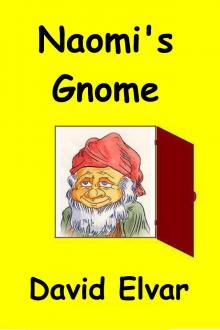 Naomi's Gnome
Naomi's Gnome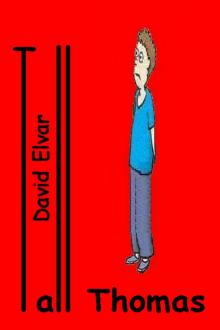 Tall Thomas
Tall Thomas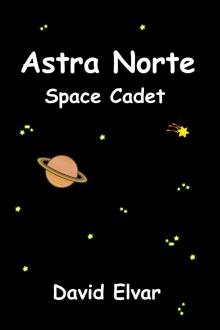 Astra Norte - Space Cadet: Log entry 1
Astra Norte - Space Cadet: Log entry 1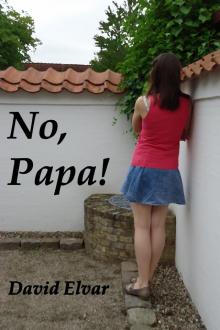 No, Papa!
No, Papa!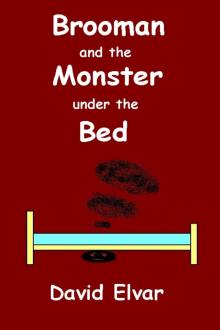 Brooman and the Monster under the Bed
Brooman and the Monster under the Bed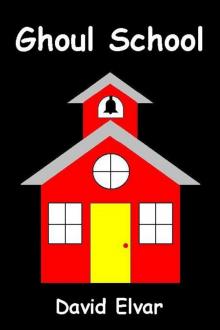 Ghoul School
Ghoul School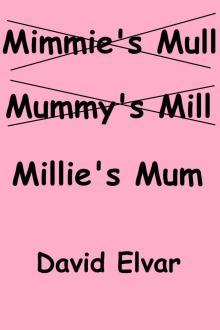 Millie's Mum
Millie's Mum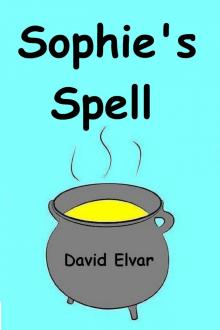 Sophie's Spell
Sophie's Spell_preview.jpg) The story of Athene and Arachne (How the spider was created)
The story of Athene and Arachne (How the spider was created)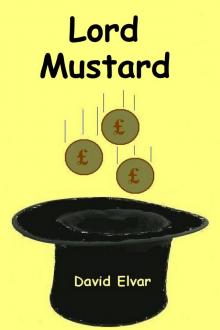 Lord Mustard
Lord Mustard